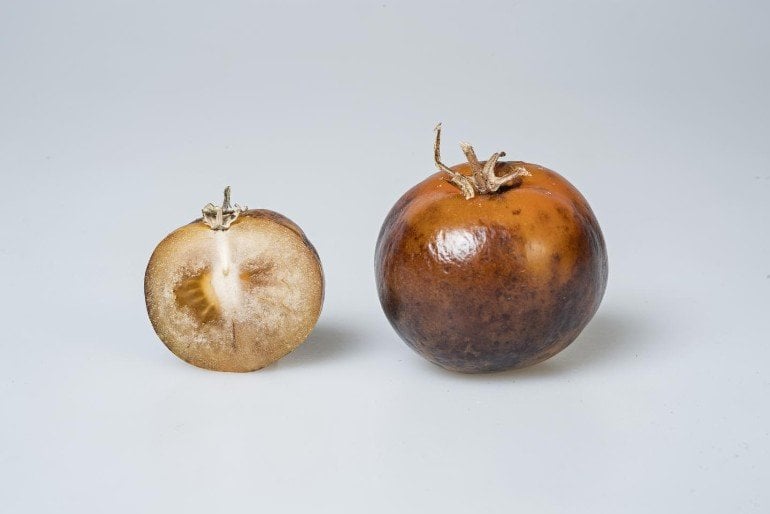Summary: Genetically modified tomatoes enriched with L-DOPA may become a new and more affordable source for the essential Parkinson’s disease drug.
Source: John Innes Center
Scientists have produced a tomato enriched in the Parkinson’s disease drug L-DOPA in what could become a new, affordable source of one of the world’s essential medicines.
The development of the genetically modified (GM) tomato has implications for developing nations where access to pharmaceutical drugs is restricted.
This novel use of tomato plants as a natural source of L-DOPA also offers benefits for people who suffer adverse effects – including nausea and behavioral complications – of chemically synthesised L-DOPA .
Tomato – was chosen as a widely cultivated crop that can be used for scaled up production and potentially offering a standardised and controlled natural source of L-DOPA .
The John Innes Centre led team modified the tomato fruit by introducing a gene responsible for the synthesis of L-DOPA in beetroot where it functions in the production of the pigments betalains.
L-DOPA is produced from tyrosine, an amino acid found in many foods. The research team inserted a gene encoding a tyrosinase, an enzyme that uses tyrosine to build molecules such as L-DOPA . This elevated the level of L-DOPA specifically in the fruit part of the plant and led to higher yields than those associated with L-DOPA production in the whole plant.
The levels achieved in the tomato fruit – 150mg of L-DOPA per kg of tomatoes – were comparable those observed in other L-DOPA accumulating plants – without some of the known drawbacks that have hampered plant metabolic production of the drug previously.
The aim now is to create a production pipeline where L-DOPA is extracted from the tomatoes and purified into the pharmaceutical product.
Professor Cathie Martin (FRS), corresponding author of the study explains: “The idea is that you can grow tomatoes with relatively little infrastructure. As GMOs (genetically modified organisms) you could grow them in screen houses, controlled environments with very narrow meshes, so you would not have pollen escape through insects.
“Then you could scale up at relatively low cost. A local industry could prepare L-DOPA from tomatoes because it’s soluble and you can do extractions. Then you could make a purified product relatively low tech which could be dispensed locally.”
Parkinson’s disease is a growing problem in developing countries where many people cannot afford the daily $2 price of synthetic L-DOPA .
L-DOPA is an amino acid precursor of the neuro-chemical dopamine and is used to compensate for the depleted supply of dopamine in Parkinson’s disease patients.
Also known as Levodopa, L-DOPA has been the gold standard therapy for Parkinson’s disease since its establishment as a drug in 1967. It is one of the essential medicines declared by the World Health Organisation (WHO) and its market value is in the hundreds of billions of dollars.
The most common form of the drug is produced by chemical synthesis, but natural sources are also available. Only a few plants have been reported to contain measurable quantities of the molecule, mainly in seeds.

The most studied is the velvet bean, Mucuna pruriens, which contains up to 10% L-DOPA in its seeds. But this is problematic because the plant is covered in urticating hairs that contain mucunian that can cause irritation and allergic reactions in field workers who harvest the crop. The beans themselves cause elevated levels of tryptamines that can cause hallucinations in Parkinsons disease patients.
“We have demonstrated that the use of the tyrosinase-expressing tomatoes as a source of L-DOPA is possible. It’s a further demonstration of tomato as a strong option for synthetic biology. Additionally, there were surprising beneficial effects including improvement in shelf-life and raised levels of amino-acids that we can investigate,” says first author Dr Dario Breitel.
About this Parkinson’s disease research news
Source: John Innes Center
Contact: Adrian Galvin – John Innes Center
Image: The image is credited to Phil Robinson
Original Research: Closed access.
“Metabolic engineering of tomato fruit enriched in L-DOPA” by Cathie Martin et al. Metabolic Engineering
Abstract
Metabolic engineering of tomato fruit enriched in L-DOPA
L-DOPA, also known as Levodopa or L-3,4-dihydroxyphenylalanine, is a non-standard amino acid, and the gold standard drug for the treatment for Parkinson’s Disease (PD). Recently, a gene encoding the enzyme that is responsible for its synthesis, as a precursor of the coloured pigment group betalains, was identified in beetroot, BvCYP76AD6. We have engineered tomato fruit enriched in L-DOPA through overexpression of BvCYP76AD6 in a fruit specific manner. Analysis of the transgenic fruit revealed the feasibility of accumulating L-DOPA in a non-naturally betalain-producing plant. Fruit accumulating L-DOPA also showed major effects on the fruit metabolome. Some of these changes included elevation of amino acids levels, changes in the levels of intermediates of the TCA and glycolysis pathways and reductions in the levels of phenolic compounds and nitrogen-containing specialised metabolites. Furthermore, we were able to increase the L-DOPA levels further by elevating the expression of the metabolic master regulator, MYB12, specifically in tomato fruit, together with BvCYP76AD6. Our study elucidated new roles for L-DOPA in plants, because it impacted fruit quality parameters including antioxidant capacity and firmness. The L-DOPA levels achieved in tomato fruit were comparable to the levels in other non-seed organs of L-DOPA – accumulating plants, offering an opportunity to develop new biological sources of L-DOPA by widening the repertoire of L-DOPA-accumulating plants. These tomato fruit could be used as an alternative source of this important pharmaceutical.






